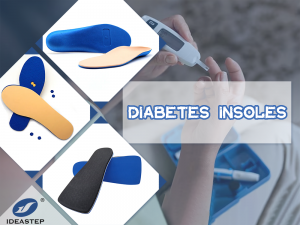
As we know, diabetic foot is prone to some complications, such as ulcers. So, what factors should be considered when choosing insoles?
When choosing insoles, diabetics should consider the following factors:
1. Cushioning and Pressure Redistribution
Diabetics often experience neuropathy (nerve damage) and reduced circulation in their feet. Therefore, it’s crucial to select insoles that provide adequate cushioning and shock absorption to minimize pressure points and reduce the risk of developing foot ulcers. Look for insoles with materials like foam, gel, or specialized diabetic-friendly inserts designed to distribute pressure evenly.
2. Arch Support and Stability
Proper arch support helps maintain foot alignment, stability, and balance. Insoles with built-in arch support can prevent excessive foot pronation (inward rolling) or supination (outward rolling) and reduce strain on the feet and ankles. It’s essential to find insoles that offer the right balance of support and flexibility for diabetic feet.
3. Moisture-Wicking and Breathability
Diabetic individuals are prone to foot perspiration and moisture buildup, which can increase the risk of fungal infections. Look for insoles made from materials that have moisture-wicking properties and allow air circulation, such as breathable fabrics or perforated designs. This helps keep the feet dry and reduces the likelihood of bacterial or fungal growth.
4. Proper Fit and Size
Insoles should fit comfortably within your shoes without causing any crowding or discomfort. Ill-fitting insoles may lead to friction, blisters, or pressure points. It’s important to choose insoles that match the size and shape of your shoes, ensuring a snug but not tight fit.
5. Consultation with Healthcare Provider
Diabetics should always consult with their healthcare provider, such as a podiatrist or foot specialist, for guidance on selecting the most appropriate insoles for their specific foot condition, level of neuropathy, and any existing foot deformities or complications. Their expert advice will ensure you make an informed decision regarding the best insole options for your needs.
Remember, regular foot examinations, diligent foot care, and wearing properly fitted and supportive footwear are essential for diabetics in maintaining foot health.
Expand more related content: https://www.aideastep.com/diabetes-insole/.
